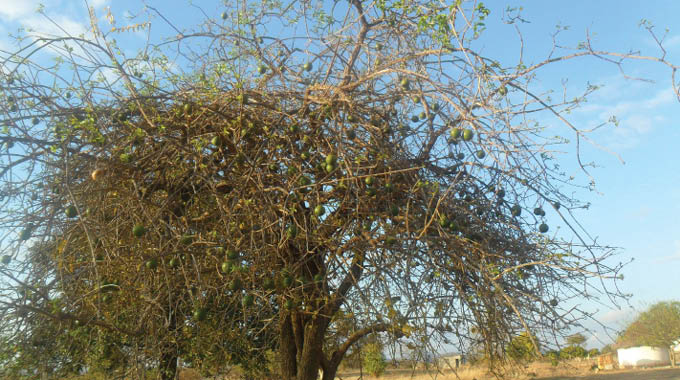Climate change threatens wild fruits’ existence

Pamenus Tuso
From time immemorial, wild fruits have occupied a special place in the lives of rural people in many southern Africa countries including Zimbabwe.
Indigenous fruits are a reliable source of food in times of hunger and have saved many remote communities from starvation. They also serve as a key supplementary food even in times of plenty. In addition to being a food source, many families in southern Africa also depend on fruit trees for medicine and even for making curios.
Despite playing these critical food security and medicinal roles, indigenous wild fruit trees have been slowly dwindling owing to a number of factors, chief among them climate change. The other major challenges are loss through poaching and veld fires.
A tree planting fanatic, Mr Never Bonde, who is also Zimbabwe’s National Tree Ambassador said the future of wild fruit trees is uncertain due to changing weather patterns which have been blamed for successive droughts not only in Zimbabwe but in Africa at large.
Mr Bonde said continuing dry spells have also compromised the quality of indigenous fruit trees.
He said wild trees such as muroro (ububese in IsiNdebele and wild custard-apple in English) whose fruits people used to eat long ago have disappeared in some areas because of changing weather patterns.
“Wild fruits need a lot of rains for them to grow well and produce fresh taste, juice and jelly. Because of lack of water, some wild fruits now produce a bitter taste and are prone to a lot of diseases,” said Mr Bonde.
In his own small way, Mr Bonde has come up with several initiatives to try and save some indigenous fruit trees from extinction. As part of the initiative, he is nurturing an indigenous wild fruit nursery at Ruchera Primary School in Nyanga in Manicaland province.
“I am working with Ruchera Primary School in Nyanga to raise 4 000 indigenous wild fruit plants which we hope to distribute throughout the country. We have tasked the children to collect the seedlings from the bushes as well as source organic manure which is ideal for the planting of the plants,” he said.
Mr Bonde said he chose Nyanga for the project because of its endowment with various wild fruits and its being a high-rainfall area.
A global organisation, International Centre for Research in Agroforestry (ICRAF) has also embarked on a programme to domesticate and cultivate indigenous fruits in Zimbabwe and other developing countries.
The project which is being implemented locally in collaboration with the Department of Research and Specialist Services as well as the Forestry Commission is targeting among other species the wild loquat (mushuku or mazhanje in Shona) and monkey orange.
“We have a trial of wild loquat at Domboshawa Training Centre while the other trials of marula (umganu in Ndebele) were neglected when ICRAF funding dried up in Zimbabwe. We have a beautiful trial of monkey orange in Zambia and wild loquat as well,” said Dr Betserai Isaac Nyoka, a tree scientist working for ICRAF which conducts research into propagation, selection and breeding of superior cultivars.
Propagation and breeding of wild fruits however has its own challenges according to Dr Nyoka.
“There are challenges with the propagation of some (not all) of the indigenous fruits. For example, grafting in Strychnos cocculoides is a challenge with graft uptake at lower than 50 percent,” he said.
Funding challenges have also affected the indigenous domestication programme in Zimbabwe.
Dr Nyoka also decried the dwindling of wild fruit trees in the country.
“Trees in the wild are declining in numbers due to droughts, land clearing and deforestation. With the increased exploitation of the trees for income generation, harvests from the wild is also increasingly,” he said.
Recent studies in Malawi have shown that dwindling of indigenous fruits is associated with decreased fruit consumption as well as malnutrition.
The Forestry Commission is, too, involved in the training of smallholder farmers on how to preserve and conserve wild fruit trees.
“We have been conducting various trainings on how to preserve and conserve our forests. We want people to appreciate the value of our forests,” said Ms Violet Makoto, Forestry Commission spokesperson in a telephone interview.
Ms Makoto however expressed concern over the over-exploitation of some wild fruits such as wild loquat for commercial purposes.









Comments